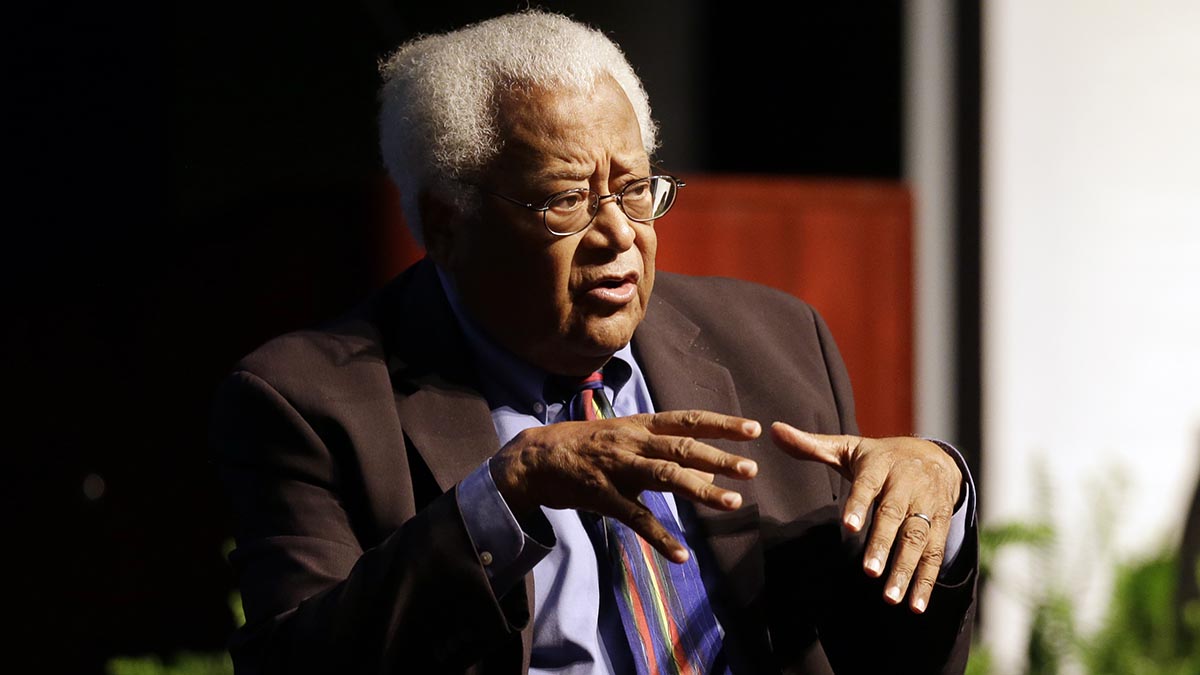The funeral for the Rev. James Lawson Jr., a civil rights icon and longtime pastor of Holman United Methodist Church in South Los Angeles, is scheduled for Monday.
The Los Angeles Sentinel, which first reported the news, said Lawson died of cardiac arrest on Monday morning. His family told The Associated Press that he died Sunday in Los Angeles after a short illness. He was 95.
“Today, Los Angeles joins the state, nation and world in mourning the loss of a civil rights leader whose critical leadership, teachings and guidance confronted and defeated centuries of systemic oppression, racism and injustice,” Los Angeles Mayor Karen Bass said in a statement.
“The life and legacy of Rev. James Lawson Jr. resonates in the ongoing movement to advance social and economic justice in and around Los Angeles. He dedicated his life to equality and justice and helped teach nonviolent protest to a generation of national leaders, including Dr. Martin Luther King Jr. and Rep. John Lewis. These teachings changed the course of history.”
“Here in Los Angeles, Rev. Lawson mentored many activists and organizers who helped shape the civil rights and labor movements locally as well as nationally.”
Bass said Lawson “was kind enough to meet with the young people we were working with in South Los Angeles when he founded our community coalition organization to teach them about the civil rights movement and train them in nonviolent protest strategies.”
“Pastor Lawson has also been an invaluable mentor to me,” Bass said.
“I continued to seek his counsel throughout my tenure as an organizer, activist and public official. He was there for me, and I know he was there for the countless civic and religious leaders in Los Angeles who were guided and influenced by his teachings.”
Los Angeles City Council Member Heather Hutt, who held a memorial service for Lawson outside Holman UMC in January, confirmed Lawson’s passing, telling City News Service in a statement, “Reverend James Morris Lawson was a leader in our community and the world, whose message of love and nonviolence left an indelible mark on the civil rights movement and inspired so many. We are deeply saddened to learn of his passing, but his legacy will continue to walk our paths. His message of love will live forever in the hearts of all he touched. Rest in Peace.”
Democratic Rep. Mike Gipson of Carson said in a statement he was saddened by the death of a “civil rights legend.”
“We are sad to lose such an iconic figure, but in awe of such an extraordinary life,” Gipson said. “His legacy remains, including the nonviolent work of the James Lawson Institute, the vast amount of writing published during his time in California, and the many ways our community has advocated for the freedom of others to this day. Rest in peace.”
“We have lost a giant,” said author and talk show host Tavis Smiley.
“The ultimate teacher and practitioner of civil disobedience and nonviolent resistance,” Smiley wrote on social media, “his message resonates so deeply in these times of rampant violence at home and abroad. His calm voice will be missed.”
Lawson served as pastor of Holman United Methodist Church from 1974 until his retirement in 1999. The one-mile section of Adams Boulevard from Crenshaw Boulevard in front of the church to Arlington Avenue was named “The Rev. James Lawson Mile” in January.
He was born James Morris Lawson Jr. on September 22, 1928, in Uniontown, Pennsylvania, the son and grandson of a Methodist minister, and grew up in Massillon, Ohio.
Lawson was drafted into the U.S. Army while a student at Baldwin Wallace College in Berea, Ohio, but refused military service due to his nonviolent beliefs and was sentenced to two years in prison.
Released after 13 months, Lawson returned to college to finish his studies and then traveled to Nagpur, India as a Methodist missionary to study the tactics of nonviolent resistance developed by Mahatma Gandhi.
Lawson returned to the United States in 1956 and enrolled at Oberlin College’s Graduate School of Theology in Ohio. One of Lawson’s professors introduced him to Dr. King, who was an adherent of Gandhi’s principles of nonviolent resistance, according to a biography by the Stanford University-based Martin Luther King Jr. Institute.
In 1957, Dr. King encouraged Lawson to move to the South, saying, “Come on, there’s no one like you in the South. He moved to Nashville, Tennessee, and enrolled at Vanderbilt University, where he began teaching techniques of nonviolent protest.
Following a student-initiated lunch counter sit-in at a Woolworth store in Greensboro, North Carolina, in February 1960, Lawson and several local activists launched a similar protest at a store in downtown Nashville. More than 150 students were arrested before city leaders agreed to desegregate some of the lunch counters.
Lawson was expelled from Vanderbilt University in March 1960 for his involvement in the Nashville desegregation movement. He eventually reconciled with Vanderbilt and returned to teach as a distinguished professor at the university. Vanderbilt established an Institute for the Study and Research of Nonviolent Movements in his name in 2021.
Lawson took part in the 1961 Freedom Rides which challenged racial segregation on interstate buses and bus terminals.
Lawson became pastor of Centenary Methodist Church in Memphis, Tennessee, in 1962. In 1968, when black sanitation workers in Memphis went on strike for higher wages and union recognition after two co-workers were crushed to death in an accident, Lawson served as chairman of the strike committee.
Lawson and King led a demonstration in support of the strikers on March 28, 1968, but it was quickly called off when violence broke out.
In his final speech on April 3, 1968, the day before he was assassinated, King described Lawson as one of the “noble men” who inspired the black liberation movement.
“He went to prison for his fight, he was expelled from Vanderbilt University for his fight, but he continues to fight for the rights of his people,” King said.

